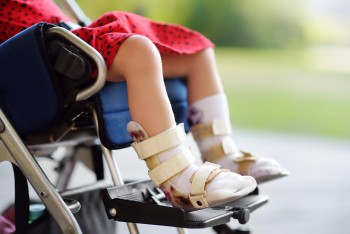Reflections on caring for children with medical complexity during COVID-19
By Dr. Catherine Diskin, Dr. Eyal Cohen, and Dr. Julia Orkin
The direct effects of COVID-19 on children have to date been minimal. The indirect consequences for children with medical complexity (CMC) have been significant, including changes to health care delivery to challenges providing care at home, concerns about caregiver illness, home care providers, and limited access to medication and supplies.
One of the critical challenges of providing care during a pandemic is the unprecedented speed at which clinical care is changing: virtual care, cancellations of non-essential services, and significant changes to routines can be overwhelming for clinicians and families alike. Reliance on trusted information sources such as provincial public health authorities is essential for reliable real-time guidance.
Fear of exposure to COVID-19 is a real concern for families, with potential consequences including hospital avoidance. We can support families by acknowledging their concerns and emphasizing how important it is to seek prompt and emergent medical care if needed. By informing families of the rapidly evolving hospital safety practices and infection control measures, we aim to support and reassure them. In hearing their concerns, we, as a complex care program, continue to advocate for streamlined approaches to care within the hospital for our patient population and others who are deemed high-risk.
Like many of our paediatric colleagues, we have had to postpone the majority of in-person complex care visits. Instead, we are supporting patients and their families with virtual visits or phone calls. Clinicians remain accessible, and support continues from our entire team, including allied health providers. We hold multi-disciplinary conferences virtually and have found that many subspecialists are comfortable joining in. Through virtual visits, we have found a new type of connection with families, seeing their home environment and, in turn, sharing ours. While virtual visits are not without challenges, even the simple telephone has been surprisingly functional for many encounters.
Coping at home in the time of COVID-19
Caregiver illness and/or self-isolation
Families are apprehensive about the prospect of a primary caregiver becoming unwell or needing to self-isolate. Thus, we have worked with families to encourage them to consider alternative plans for caregiving needs. This includes having sufficient medical supplies at home in case of self-isolation (such as a two-week medication supply) as well as identifying people who could support their child’s care should they become unwell. We have offered virtual refresher training for alternate caregivers on topics such as gastrostomy tube care. We are working with respite and hospital partners to identify respite options for families in case of an emergency.
Provision of homecare
Families continue to struggle with decisions about the continuation of homecare services. Many have cancelled nursing services because they are worried about increased infection risk from individuals coming in and out of the home. We are collaborating with home care agencies to determine how to continue homecare services while maintaining safety through infection control and prevention (for example, screening home care providers before nursing shifts and ensuring personal protective equipment is available). We encourage families to work with their home care coordinators to determine appropriate care plans and to ensure transparency and communication about infection control.
Supplies: Equipment and Medication
Many health care providers and families are concerned that the increasing demand for health care supplies, such as medications and equipment, will affect their child’s care. We recommend that families contact their pharmacy for medical refills well in advance to minimize delays. Some families have experienced shortages of formula due to supply chain disruption. We have been working closely with dietitians and families to determine safe alternatives and encourage families to work directly with their clinical care teams to ensure they have enough supplies to get through a 14-day self-isolation.
Parental well-being
Stress and mental health are concerns for all families right now, especially those whose children have medical complexity. There may be uncertainty about the future or financial stability. With changes to traditional supports such as home care, respite, and school, families are tired. We acknowledge the experience families share with us, highlight the importance of sleep, exercise, and remaining connected with loved ones to ensure their well-being. We provide options for virtual mental health support as needed.
We believe there will be an increased need for such services in the coming months, and we will continue to advocate for our patients’ and families’ needs to ensure their safety, continued care and support.
Health care provider well-being
Health professionals are also experiencing extraordinary stress from COVID-19, leading to fatigue and stress at home and work. Instead of our weekly in-person team meeting, we now host two virtual meetings weekly. These meetings allow us to share updates, troubleshoot clinical issues, and, most importantly, to check-in with each other. Constant mindfulness of ourselves and our peers is necessary as we negotiate our way forward.
In this time of the COVID-19 pandemic, clinicians, families, and children face extraordinary changes and challenges. We are continuously adapting how we provide continuing care. As partners in care with families, as we live, this “new” normal, continued support of each other, flexibility in care provision and advocacy are fundamental.
Dr. Catherine Diskin, Dr. Eyal Cohen and Dr. Julia Orkin are with the Division of Paediatric Medicine, The Hospital for Sick Children, and the Department of Paediatrics, University of Toronto. Dr. Cohen and Dr. Orkin are also with the Child Health Evaluative Sciences, SickKids Research Institute.
Copyright
The Canadian Paediatric Society holds copyright on all information we publish on this blog. For complete details, read our Copyright Policy.
Disclaimer
The information on this blog should not be used as a substitute for medical care and advice. The views of blog writers do not necessarily represent the views of the Canadian Paediatric Society.
Last updated: May 27, 2020

